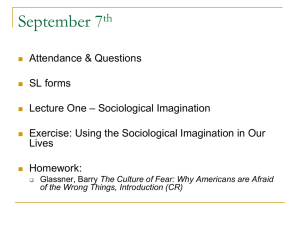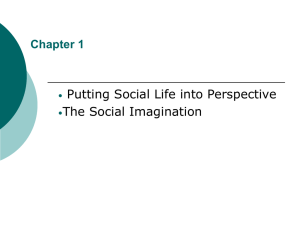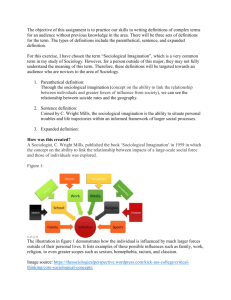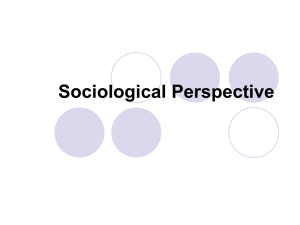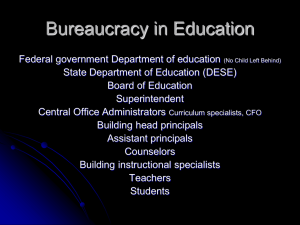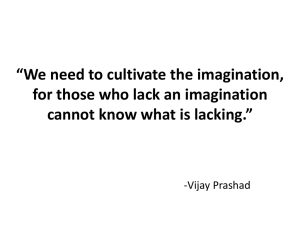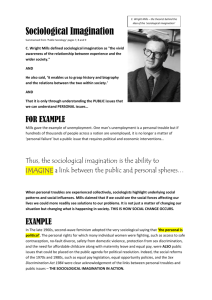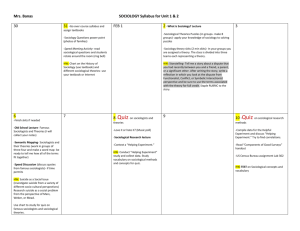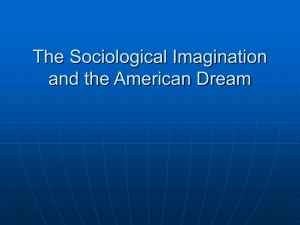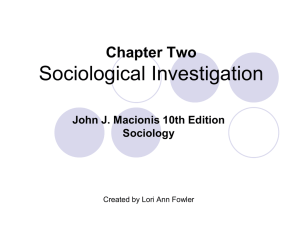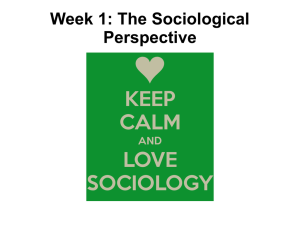What is the sociological imagination?
advertisement
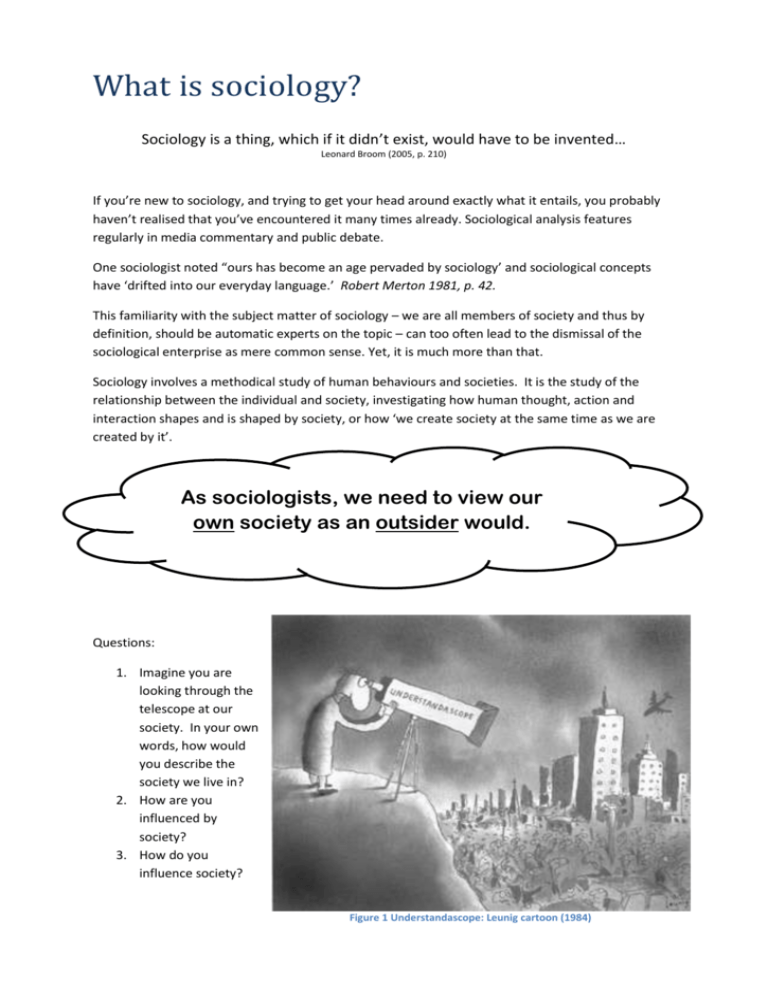
What is sociology? Sociology is a thing, which if it didn’t exist, would have to be invented… Leonard Broom (2005, p. 210) If you’re new to sociology, and trying to get your head around exactly what it entails, you probably haven’t realised that you’ve encountered it many times already. Sociological analysis features regularly in media commentary and public debate. One sociologist noted “ours has become an age pervaded by sociology’ and sociological concepts have ‘drifted into our everyday language.’ Robert Merton 1981, p. 42. This familiarity with the subject matter of sociology – we are all members of society and thus by definition, should be automatic experts on the topic – can too often lead to the dismissal of the sociological enterprise as mere common sense. Yet, it is much more than that. Sociology involves a methodical study of human behaviours and societies. It is the study of the relationship between the individual and society, investigating how human thought, action and interaction shapes and is shaped by society, or how ‘we create society at the same time as we are created by it’. As sociologists, we need to view our own society as an outsider would. Questions: 1. Imagine you are looking through the telescope at our society. In your own words, how would you describe the society we live in? 2. How are you influenced by society? 3. How do you influence society? Figure 1 Understandascope: Leunig cartoon (1984) Figure 2 Scene from Czech National Puppet Theatre's 'Don Giovanni' Peter Berger, (1963) a famous sociologist, thought about sociology in this way: ‘We see the puppets dancing on their miniature stage, moving up and down as the strings pull them around, following the prescribed course of their various little parts. We learn to understand the logic of this theatre and we find ourselves in its motions. We locate ourselves in society and thus recognize our own position as we hang from its subtle strings. For a moment we see ourselves as puppets indeed. But then we grasp a decisive difference between the puppet theatre and our own drama. Unlike the puppets, we (sociologists) have the possibility of stopping our movements, looking up and perceiving the machinery by which we have been moved. In this act lies the first step towards freedom.’ Questions: 1. The puppets are described as ‘dancing on their miniature stage, moving up and down as the strings pull them around, following the prescribed course of their various little parts ’. What do you think sociologist, Peter Berger is saying about people living in society today? 2. What does the ‘logic of this theatre’ represent? 3. What is your ‘position’ in society? Is it a low, medium or high position? Explain why? What are the ‘subtle strings’ that are associated with your position? 4. If the puppet theatre is ‘our society’, what is Peter saying about our society? 5. What do you think ‘the machinery by which we have been moved’ is? 6. Explain how freedom comes when we stop our movements, look up and perceive the machinery by which we have been moved? What is the sociological imagination? The sociological imagination template Historical Structural Sociological Imagination Cultural Critical When you want to remember what the sociological imagination entails and need to sociologically analyse a topic, simply recall this diagram in your mind and imagine applying its four features to your topic of study. 1. Historical Factors: How have past events influenced the present? 2. Cultural Factors: What influence do tradition, cultural values, and particular belief systems have on our behaviour and social interactions? 3. Structural factors: How do various forms of social organisation and social institutions affect our lives? How do these vary over time and between countries and regions? 4. Critical factors: Why are things as they are? How could they be otherwise? Who benefits and who is disadvantaged by the status quo? What ‘alternative futures’ are possible? How do sociological insights relate to our own life experiences? Think about marriage. Since the mid 1970s, family relationships have gone through massive change: - Before the 60s, it was generally accepted that marriage was a life-long commitment, but during that decade, people started questioning this idea. The contraceptive pill introduced in the early 60s created a massive revolution in how people thought about sex. In the 1970s, changes to family law made it easier to end marriages. From that point, people started suggesting different relationship options: “open” marriages, serial monogamy (Marry – divorce – remarry – divorce and so on) and living together before marriage which was then institutionalised in ‘de facto’ relationships. Task 1: Use the general questions above and change them into questions that will help you apply your sociological imagination to the institution of marriage. Here’s the first one done for you: Eg) Historical factors: How have past events influenced the present state of marriage? Task 2: Apply your ‘sociological imagination’ to the institution of marriage. You can do this simply by answering the questions you have just created. A sociological autobiography – Homework Task This exercise asks you to apply the sociological imagination to understand the person you have become. Apply the four parts of the sociological imagination template to yourself by briefly noting some of the major influences on your beliefs, interests, and behaviour. In other words, write a short sociological autobiography by considering the following: 1. Historical Factors: How has your family background or key past events and experiences shaped the person you are? Circle 2 Historical factors you will write about from this table: You may make up your own. Family background Size of family Type of family – eg) single parent family, close family, dysfunctional family Moved around a lot Key past events Birth of a sibling Death of a family member/friend Experiences Overseas trip Significant camp/Sport in my life Divorce of parents Other? Other? Words spoken to me by a role model Religious/supernatural experience…other? 2. Cultural Factors: What role have cultural background, traditions and belief systems played in forming your opinions and influencing your behaviour? Cultural background Family from a different culture Friends from a different culture Aussie culture, other? Traditions Family traditions – eg) Christmas, Saying grace, “Johnny the peg” Traditions you’ve incorporated in your life from influences outside your family eg) – Daily meditation, writing in a diary Cultural traditions, other? Belief systems Religion – Christianity, Islam, Bhuddism, Judaism etc Consumerism, capitalism, communism, political activism, Other? 3. Structural factors: How have various social institutions influenced you? Examples of social institutions include: - Your family - School - Social Media - Religious organisations, eg) churches etc. - Government organisations eg) police, centrelink, parliament, courts, other? - The economy 4. Critical factors: In what ways have your value and opinions about what you consider important changed over time? Extension Question (why not give it a go!): What arguments would a sociologist make to counter the view that ‘biology is destiny’?

